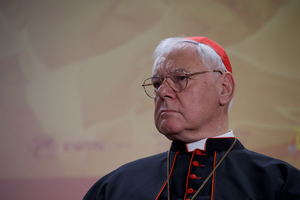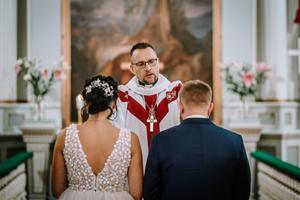Regensburg’s Bishop: Eucharist Is ‘the Goal,’ not a ‘Step Toward’
Bishop Rudolf Voderholzer is one of the seven German bishops who opposed an orientation guide published by the German bishops’ conference that would permit Protestant spouses of Catholics to receive Communion.

German bishops last month published an “orientation guide” that permits some Protestant spouses of Catholics to receive Holy Communion under certain circumstances.
More than two-thirds of German bishops’ conference voted in favor of the document in February (then called a pastoral handout), but it drew widespread criticism, in particular from seven German bishops. Among their chief concerns was treating this issue as a pastoral one instead of a “question of the faith and unity of the Church” which they said was “not subject to a vote.”
The Vatican blocked the proposal in May, saying it was not ready for publication and similarly stressing its universal nature, but after lobbying by leaders of the German episcopate, the Vatican and German bishops decided that, as the document relates to the universal Church, it would not be issued by the episcopal conference but simply published as an “orientation” aid for individual bishops. The text of the guide, however, remains the same.
Since its publication, two German bishops have been overtly following the guidelines: Archbishop Hans-Josef Becker of Paderborn allowed Holy Communion to “individual cases” of Protestant spouses of Catholics while insisting it did not constitute a “general permission” to receive the sacrament, and Bishop Franz Jung of Wurzburg issued an “open invitation” to all Protestant spouses in his diocese July 5-6 who had been married for at least 25 years.
One of the most prominent critics of the “pastoral handout” was Bishop Rudolf Voderholzer of Regensburg, one of the seven German bishops who wrote to the Vatican to oppose the initiative in March.
In this July 6 email interview with the Register, Bishop Voderholzer argues that well-established rules for ecumenical action remain in place, that questions over what constitutes “grave spiritual distress” — the key legal requirement for a Protestant spouse to receive Holy Communion — will be clarified “authoritatively and bindingly” by the Vatican, and that a bishop can only decide on allowing Communion for Protestant spouses “in unity with the universal Church.”
He remains convinced that “nothing changes” and that any further steps “are dependent on Roman guidelines.”
Is the publication of the “orientation aid,” despite not coming from the bishops’ conference itself, a defeat for the seven bishops’ opposition to it, or are you happy with the outcome?
During the discussions of the bishops in the permanent council June 25-26, 2018, two things in particular became clear: The draft document would not appear as a text of the bishops’ conference, and the letter of 25 May 2018 from Cardinal Luis Ladaria SJ, prefect of the Congregation for the Doctrine of the Faith, sets out the framework for the interpretation of the orientation aid.
Cardinal Ladaria puts it clearly in this letter: that the question of whether Christians who are not fully united with the Church may receive the Eucharist is a question that can only be decided in unity with the universal Church and therefore by the magisterium. The local bishop is to refer to universal ecclesial practice.
Have the bishops who are supportive of the handout effectively gone over the heads of the bishops’ conference to allow its publication, and with the Pope’s authorization?
The draft can serve as an orientation or study text for the bishops. In this sense, it may also be published for the use of the bishops. No more, no less. For the time being, the rules of the ecumenical directorate are and will remain authoritative for ecumenical action.
How can this orientation aid be approved by any bishop when most cases of intercommunion for Protestant spouses are not understood to be a “grave necessity” or can it be justified as in line with paragraph 45 of Ecclesia in Eucharistia, as quoted in the document, and therefore be considered in some cases to be “grave spiritual distress”?
Cardinal Ladaria put the prospect to the German bishops that questions regarding Canon 844 will be clarified authoritatively and bindingly by the relevant Vatican dicasteries on behalf of Pope Francis. This is, of course, about the concept of grave spiritual distress — what that means and what it doesn’t.
Given that Holy Communion has allegedly been given to Protestant spouses for many years in the Church in Germany, could this document in a way be positive in offering clearer guidelines on who and who cannot receive the Eucharist?
The rule applies to disputes that are not settled at the Communion rail. This makes sense in order to protect the dignity of the Eucharist. To want to derive from this any requirement for intercommunion is an adventurous misunderstanding.
What steps will you be taking next?
I will officially ask the Congregation for the Doctrine of the Faith, of which I am a member, to clarify some questions such as: What belongs to all the Catholic faith regarding the Eucharist, and what must always be assumed?
The priests of the Diocese of Regensburg are to be sent the corresponding passages of the Codex Iuris Canonici (CIC — Code of Canon Law), the rules of the ecumenical directorate, and an interview that I gave June 30 to the Tagespost. Added to this, it’s necessary to say first of all that nothing changes. Further steps are dependent on Roman guidelines.
What action might you take at the plenary assembly in September?
It is a question of deepening the debate. We should move away from a fixation on eucharistic Communion as a “step towards unity.” Eucharistic Communion is the goal, not the way. Before that, we need an honest debate about the remaining differences, some of them considerable — for example also with regard to the difference between the Last Supper and the celebration of the Eucharist. We in the bishops’ conference should achieve unanimity on these aims.
Edward Pentin is the Register’s Rome correspondent.


















